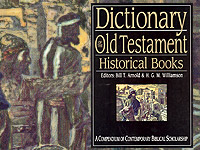Dictionary of the Old Testament Historical Books: A Compendium of Contemporary Biblical Scholarship (Bill T. Arnold and H. G. M. Williamson, 2005)

The history books of the Hebrew Old Testament are full of amazing stories, full of conquest, warfare and violence, intrigue and sex, godly reformers and wicked despots, prophets and royalty, freedom and enslavement. Though clearly written from a theological perspective, these texts are just as clearly meant to be taken seriously as history. And that raises all sorts of fascinating questions for the Christian who wants to study them as part of God’s revelation of himself in Scripture. What is the significance of these books to those of us who live so long after the events recorded in them occurred? To what extent are they true history? To what extent has the theological intention of the author(s) effected the historical accuracy? Is our definition of “true history” identical to or different from the authors of these books? How can we keep track of all the places, people, and events, and how do they fit into a single chronology? Do the findings of historians and archaeologists confirm the statements recorded in the Bible? And when the findings of extra-biblical studies raise challenges, how should these be addressed?
A resource that will help you as you study the biblical books of Joshua, Judges, Samuel, Kings, Chronicles, Ezra, and Nehemiah is the Dictionary of the Old Testament Historical Books. Not everyone needs to own a copy, but church libraries should be encouraged to stock one.

